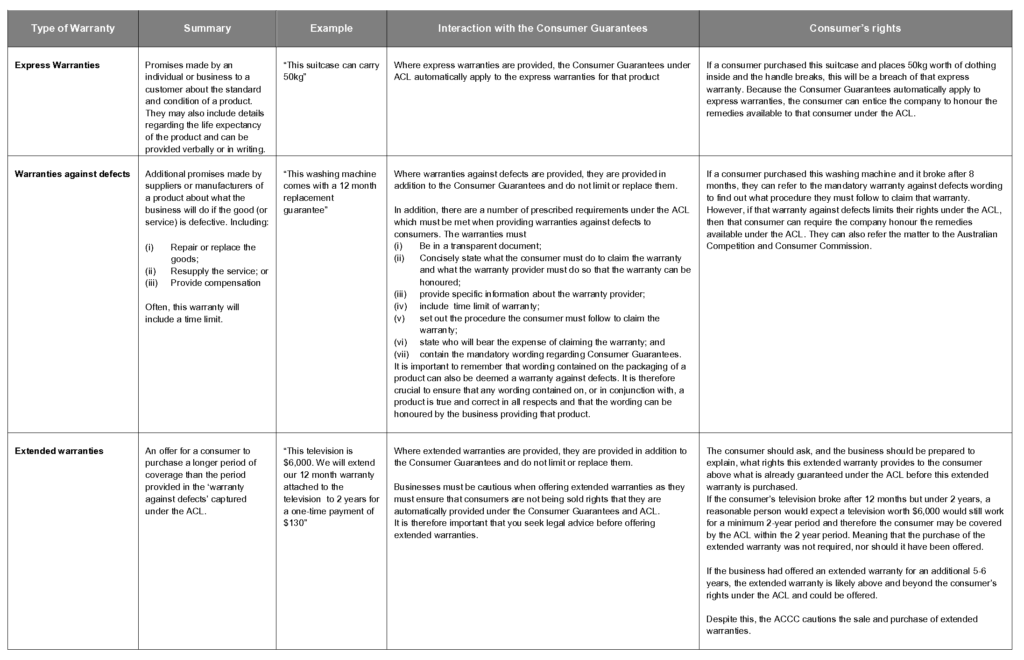Warranties are looked upon favourably by consumers. Businesses that honour a warranty are more likely to establish and maintain a good reputation. It is for these reasons that many businesses provide certain warranties over the products they sell, in particular, businesses that sell more expensive products.
As a business owner you might think that warranties are relatively straight forward. But it is important to know that not all warranties are the same and there are a range of requirements to meet under the Australian Consumer Law, depending on the type of warranty you provide. This article is also a reminder that the most crucial timing for warranties comes well after the consumer has purchased your product. But rather when something goes wrong, and a customer looks to you to honour those warranties.
As a consumer, you should be aware of your rights not only under product warranties, but also under the automatic guarantees that apply to products you purchase. Put simply, if a product you purchase is not operating as it was ‘warranted’ or ‘guaranteed’, you will have certain rights as a consumer.
What are warranties and how do they compare to the Consumer Guarantee regime?
Warranties are promises made by a representative of a business to a customer about the standard and condition of a product. Warranties are optional promises and are in addition to those consumer guarantees automatically granted to consumers under the Australian Consumer Law (ACL) when they purchase a product.
Regardless of whether a warranty is expressly provided by a business, it is important to know that certain guarantees as set out in the ACL will apply to those products. Those warranties include that those products must:
- be of an acceptable quality;
- match descriptions made by the salesperson, on packaging and labels, and in promotions or advertising;
- match any demonstration model or sample you asked for;
- be fit for the purpose the business told you it would be fit for and for any purpose that you made known to the business before purchasing;
- come with full title and ownership;
- not carry any hidden debts or extra charges;
- come with undisturbed possession, so no one has a right to take the goods away or prevent you from using them;
- meet any extra promises or warranties made about performance, condition and quality, such as life time guarantees and money back offers; and
- have spare parts and repair facilities available for a reasonable time after purchase unless you were told otherwise.
These warranties are known as Consumer Guarantees.
For more information regarding Consumer Guarantees specifically, my colleague Laura Shandley’s insightful article will likely answer any questions you might have. Click here to read the article.
In conjunction with Consumer Guarantees, there are a number of additional warranties which can be provided by a business that sells products. The below table details those warranties and how they interact with the Consumer Guarantees.
(Click on the table to enlarge)
Remedies
If a product falls short of a Consumer Guarantee or an additional warranty the business has provided, a consumer is entitled to ask for a repair, replacement or refund. The particular remedy will depend on whether the product has a minor or major problem.
A product is considered to have a major problem when:
- it has a problem that would have stopped someone from buying it if they’d known about it
- it has multiple minor problems that, when taken as a whole, would have stopped someone from buying it if they’d known about them
- it is significantly different from the sample or description
- it is substantially unfit for its common purpose and can’t easily be fixed within a reasonable time
- it doesn’t do what you asked for and can’t easily be fixed within a reasonable time; or
- it is unsafe.
Here are some examples of how warranties can be provided by businesses and relied upon by the consumer in a shop setting.
My business sells electrical goods including cordless vacuums. One of my employees told a customer that a particular vacuum had a 60 minute running time, which is incorrect. The running time for this particular vacuum is only 30 minutes. Is this a warranty? If so, do I need to honour this warranty?
Yes. Express warranties can be made verbally and if an employee represents something to a consumer throughout the sale process about what a product can do, that will be deemed a warranty. As discussed above, the Consumer Guarantees automatically apply to express warranties. Therefore, if the customer purchases the vacuum and it requires charging after 30 minutes of use, that consumer will be entitled to a remedy under the ACL.
A customer came into the store with a microwave she had recently purchased and said the electrical cables were frayed when she unwrapped the box. An employee told this customer she was only entitled to a repair. Will that cause any issues for my business?
Yes. The problem with this employee’s reply is that it represents that the only remedy to which the consumer could be entitled was repair. That is not the case. Under the ACL, the consumer could be entitled to a replacement or refund as the microwave could be deemed unsafe. Furthermore, the mere existence of the conflicting correspondence regarding the warranty (i.e. the employee’s representation and any written warranty provided with the microwave) does not affect these rights.
The representation made by this employee could also be deemed to contravene sections 18 and 29(1)(m) of the ACL.
Those sections provide:
Section 18 – A person must not, in trade or commerce, engage in conduct that is misleading or deceptive or is likely to mislead or deceive.
Section 29(1)(m) – A person must not, in trade or commerce, in connection with the supply or possible supply of goods or services or in connection with the promotion by any means of the supply or use of goods or services make a false or misleading representation concerning the existence, exclusion or effect of any condition, warranty, guarantee, right or remedy.
Key Reminders
- Warranties and any subsequent representations made to consumers about warranties and their Consumer Guarantee rights must be accurate and in accordance with the ACL.
- You cannot contract out of Consumer Guarantees. If your business has a standard set of warranties, you should have these warranties reviewed to ensure they can be enforced i.e. are not void due to inconsistency or are not in contravention of the ACL.
- You should ensure that all staff members understand and implement the businesses additional warranties (if any) and the Consumer Guarantees when communicating with customers. Particularly in relation to offering repairs, refunds or replacements.
- Consumers should understand their rights under the ACL and in respect of any additional warranties a business provides. In particular when it comes to purchasing extended warranties or returning faulty products.













